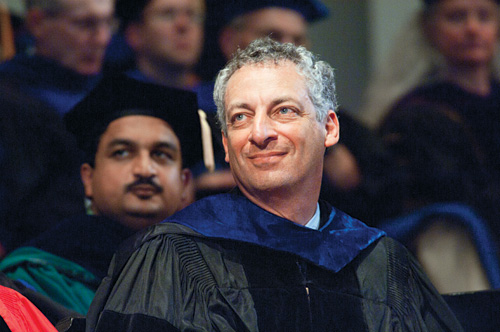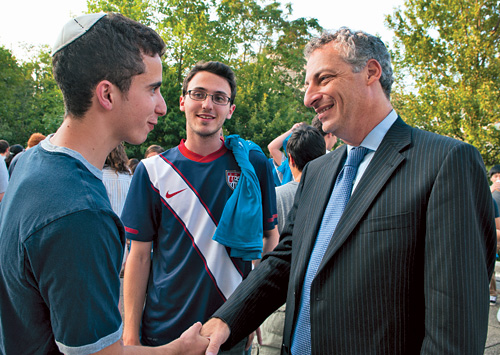Autumn 2010: Of Note

it’s personal: The desire to support students and faculty helped turn Forman from scholar to administrator.
Ann Borden
College Life
What’s important to Robin Forman, new dean of Emory College
By Paige P. Parvin 96G
It’s late on a steamy August afternoon, and Glenn Auditorium is blessedly cool and nearly empty save for dust motes dancing in the sun and University organist Timothy Albrecht, who is filling the space with Bach.
Then they begin to arrive—trickling in at first, then flooding the aisles in their flip-flops and shorts and skinny jeans and T-shirts, talking and texting on their phones, scanning for friends and seats, and sliding into the wooden pews shoulder to shoulder. With their edgy energy, they seem, at first, wholly uncertain and out of place in this formal setting.
They are the Class of 2014, the newest kids on campus and the youngest charges of Robin Forman, recently appointed dean of Emory College of Arts and Sciences, who is making one of his first public appearances at the annual fall Convocation. He’s a freshman too, he tells them, having been at Emory since early July—although he cuts a somewhat more impressive figure in his academic regalia.
For Forman, the students are at the heart of what drew him out of his more solitary role as a professor of mathematics and eventually into the position of dean of undergraduates at Rice University, where he joined the faculty in 1987.

All Ears: Emory’s search committee praised Forman for his qualifications, but also his qualities, such as the ability to listen.
Kay Hinton
“If you had told me ten years ago that I would be an administrator, I would have thought you were crazy,” he says. “I truly loved the life of a mathematician. But a number of things happened to slowly change my mind.”
In 2001, Forman became chair of the math department at Rice and found that he enjoyed collaborating and creating initiatives that benefited both faculty and students. He and his family also lived on campus for a time when he served as faculty master of a residential college. “That was a remarkable experience, getting to know the students outside the classroom,” he says. “I gained a deeper understanding of the complicated nature of their lives and a greater appreciation for all they are able to accomplish in these four years.”
Appointed Rice’s first dean of undergraduates in 2005, Forman led the creation of a Center for Civic Engagement to enhance student involvement with the greater Houston community through volunteer, internship, and research roles. He also was a champion of interdisciplinary scholarship, helping to establish minors such as computational finance, global health technologies, and energy and water sustainability.
When he learned of the departure of Robert Paul, who served as dean of the College since 2001, he felt an unexpected tug. “Emory is one of the world’s great research universities,” Forman says. “Even from Houston, I could see that Emory was on a remarkable trajectory. Helping to continue that was a very exciting idea.”
“The search committee had a series of necessary qualifications, which included excellence in scholarship, a commitment to liberal arts education, and demonstrated academic leadership,” says Micheal Giles, Goodrich C. White Professor of Political Science, who cochaired the search committee with Lisa Tedesco, dean of the Laney Graduate School. “Robin surpassed our expectations in each of those criteria. It was also important that he had achieved these at Rice University, an institution similar in many ways to Emory. But it was probably the intangibles that made him the final choice out of a very competitive field. He was well informed on pressing issues at Emory and in higher education generally and, most importantly, took time to listen to his audience.”
“We could immediately tell that his leadership turned on engaging seriously with students and faculty,” agrees Tedesco. “I think that he approaches academic leadership with an equivalent rigor that one approaches scholarship. He has a deep appreciation for graduate education, and I’m both excited and energized by his commitment.”
One of Forman’s hopes for Emory is that he can help facilitate interdisciplinary connections, although in new ways; at Rice, he did not oversee faculty, which is a core responsibility of his role here.
“Emory has been extremely ambitious and creative in finding ways to support interdisciplinary work, which is one of the elements that attracted me,” he says. “My goal is to reduce the administrative burdens and risks associated with interdisciplinary work. The faculty are already interested. Much of it will happen on its own if we just make it less burdensome. The challenge is that there are too many opportunities and we can’t pursue them all—we have to look for areas where Emory can distinguish itself and pursue those.”
Forman finds much common ground between Emory and Rice, including the high caliber of both students and faculty. He also is committed to cultivating the relationship between Emory and Atlanta, which he views as similar to that between Rice and Houston. “Atlanta is a tremendous city with wonderful resources,” he says. “The engagement with the external community is something I’m very interested in.”
During the weeks after his arrival, Forman spent most of his time walking around the University campus and visiting with the faculty, becoming increasingly impressed, he says, by the scholarship taking place across disciplines and departments. He says he will enjoy helping to raise Emory’s stature among the nation’s top research institutions by serving as an “advocate and cheerleader for the College.”
“Robin is a noted mathematician and clear thinker who is committed to combining cutting edge research and stellar classroom instruction. Under his watch, the College will reexamine its administrative organization, with the goal of aiding the priorities just mentioned; it will seek new ways of improving the educational experience for students; and it will make strategic hiring decisions, with the goal of advancing the College’s strategic plan,” says Earl Lewis, provost and executive vice president for academic affairs. “Finally, I think Robin will explore new ways of improving the College’s economic fortunes, in light of the global recession. He will forge these changes in a manner consistent with his management style: inclusive listening and decisive action.”
Forman says he is especially impressed by the welcome he has received—both for himself and for his wife, Ann Owens, formerly executive director of the Houston Grand Opera, and their son, Saul, who is twelve and rumored to be something of a baseball prodigy. Saul will be attending Westminster Schools and playing ball for the East Cobb Astros. “We’re a baseball family,” says Forman, whose own interests include chess and stand-up comedy.
“I have never been on a campus that took the notion of community as seriously as Emory does,” Forman says. “From the first phone call, everyone has been tremendously welcoming, not just to me but to my wife and son. It seems to be a very real part of what Emory is.
“There is truly spectacular work taking place in every area of campus—both path-breaking research and creative pedagogy,” he adds. “The more I learn, the more excited I am to be here.”